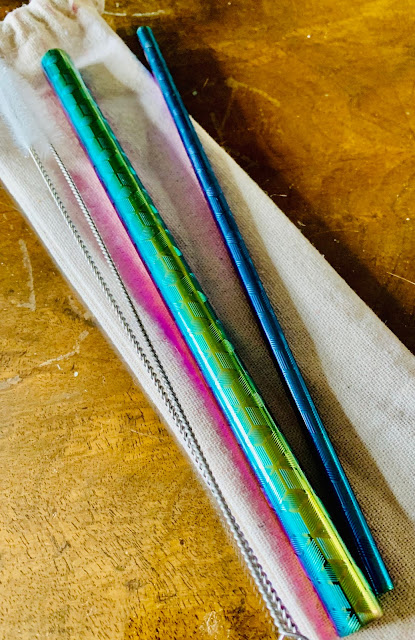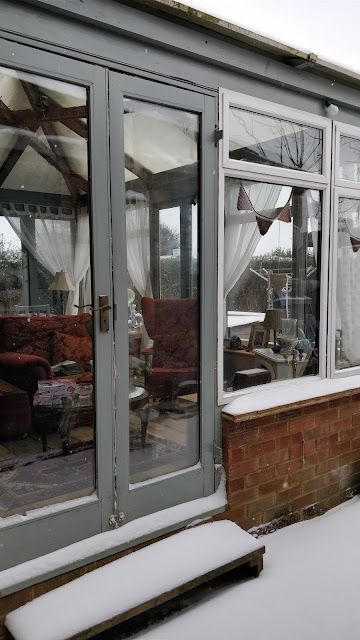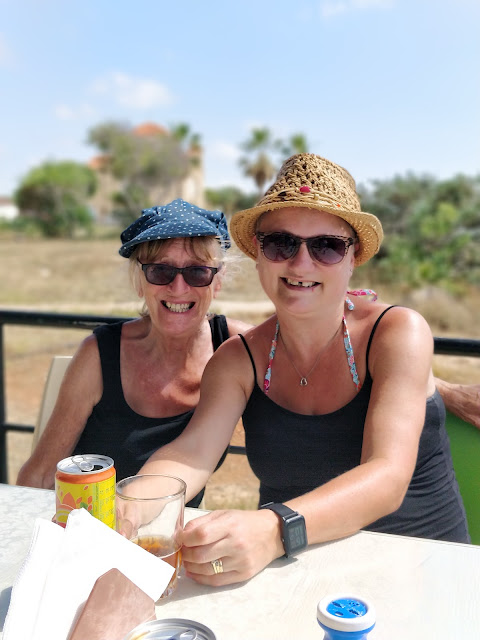Buying a pack of stainless steel straws might seem like the teeniest drop in a plastic polluted ocean, especially when you realise that this year, with every drink ordered while on holiday in Cyprus the glass was stuffed with multiple plastic straws, umbrellas, sparklers and bizarre pipe-cleaner creatures.
And I'll admit part of my reason for buying the reusable straws was "dang they are pretty" (I have rainbow coloured ones) and partly down to my hatred of the paper straws which are increasingly replacing plastic ones in pubs and restaurants.
I even managed to solve the thick milkshake/bubble tea issue by purchasing a wide bore stainless steel straw and apart from the faff of remembering to clean them when I get home after using them, they are working very well. I carry a few in a little bag now so I can share them out with my companions.
So my eco-friendly actions might not be entirely selfless but although sustainability seems like a bit of a buzz word at the moment, how individuals respond to the call is going to prove crucial in the long run.
Yes, my straws are ethically sourced peanuts compared to the impact global companies can have on our world but as the famous UK supermarket advertising catchphrase goes, "Every Little Helps."
It can be a struggle. Often it costs more to buy earth friendly items, especially at first when you are replacing things you usually use. Locally sourced, unpackaged items are often more expensive than produce stocked by your local supermarket and learning to eat food in season can be tricky if you want strawberries for your Valentine dessert in February.
Sometimes though the initial expense pays off in the long run. Shampoo bar £8.50 vs shampoo bottle £1 - eek! However based on my experience so far my shampoo bar will last a lot longer than even eight bottles of shampoo.
In one way my innate thriftiness helps as I love recycling and charity shops. Most of our furniture and a good proportion of the entire families clothes are second hand or hand-me downs and our trips to the dump are more often than not to pick things up as much as dropping things off.
Our local recycling site has an awesome store where for very little money you can buy anything from chairs and bicycles to electric guitars and golf clubs.
We waste very little food thanks to some creative cookery and I've been known to accept fridge treasure from friends going away.
It sometimes feels like a version of that old TV show, Ready Steady Cook where contestants were given a random bag of ingredients and challenged to create a meal. Neighbour hands over one pepper, three slightly mushy tomatoes and half an onion? Mmm -homemade pasta sauce coming up!
Even our mostly wooden conservatory is recycled, dismantled from a friend's home where it had stood for decades after her dad built it. We rebuilt it, repairing just small sections which were damaged, painted it and laid a floor made from old scaffold boards. The sofa, lamps and chairs in it came from friends and the dining table was a Freecycle find.
I've used fabric bags for my shopping for years and we have a selection of recycling boxes for glass, plastic, cardboard, paper, food waste and green waste like lawn mowings.
It still astounds me how much plastic we recycle so recently I've turned my attention to cutting that down. This coincides with an increasing skin sensitivity so I've swapped our bottled hand washes for old fashioned soaps and as I mentioned earlier, my shampoo, conditioner and body wash for a chamomile, reship and lemon shampoo/body wash bar which makes my soul sing with joy every time I use it as it smells sooooooo good.
It actually took some effort to find a bar without loads of added chemicals. Just because it looks natural and it being sold in a store which boasts about its sustainability credentials does not mean a product is much better than your branded, TV celeb advertised product. Read the labels folks!
This week the news in the UK has been filled with the activities of Extinction Rebellion who took action at airports, including one man who glued himself to the top of an aeroplane.
Whatever you think of their methods it's true that transport and travel are big issues for the planet and that's going to be the hardest change to make for our family.
My mum lives in Cyprus and although we speak regularly across the miles via video apps nothing beats physically getting together and that means we have to fly.
We drive two diesel cars but can't afford to replace them just yet for anything cleaner. Living in a village with truly terrible public transport links means a car is vital, especially when you have to get to work and ferry children around for clubs and activities which are pretty much always out of our village.
We do use leg-powered scooters whenever possible for the school run, trips around the village and to replace taxi rides whenever possible.
Memorably we used our scooters to get to and from a 50th birthday party in a city where the nearest hotel was a short drive or a longish walk.
We scooted it in 15 minutes and gave drivers in the early hours something to look at as I was wearing an ankle length fake fur coat and a silver skirt and our scooters have multiple lights so we can be seen in the dark.
Realistically people are going to want to travel, especially for holidays for some time into the future so the best you can do it make sure your holiday destination or provider is as planet-friendly as possible.
Take Yellow Zebra Safaris for example who organise safaris in Kenya and give back a percentage of their profits to conservation and the community through donations to a range of charities including one which rescues orphaned baby elephants and another which helps fund a dog detection team in Africa.
The dogs trained for use by this team can sniff out ivory, drugs, firearms and the world's most trafficked animal, the pangolin being smuggled out of airports and ports.
Yellow Zebra Safaris even has eco-lodges and eco-camps and offers visitors the opportunity to contribute directly to the native communities with some camp charges going directly to local people.
You can even book specific conservation and sustainable holidays through them. From solar powered generators to swapping plastic bottles for glass Yellow Zebra Safari's suppliers and partners are doing their best to give you an unforgettable experience with as little cost to the planet as possible.
It's an exciting and memorable way to live your best life while helping to give back to Earth and its people. Doesn't that sound better than frazzling by a pool on an anonymous resort?
Meanwhile while you plan your holiday, it's worthwhile changing even just a few things to help do your bit for future generations.
It's an inescapable fact that living a more eco-conscious world is going to take effort and involve sacrifice, financial and personal, and we might not see the results in our lifetime but the doomsday clock is ticking louder and louder and it's our duty to at least try and do our part.
Disclaimer: This post forms part of my entry into a competition organised by Yellow Zebra Safaris. Views and Opinions remain honest and my own.
And I'll admit part of my reason for buying the reusable straws was "dang they are pretty" (I have rainbow coloured ones) and partly down to my hatred of the paper straws which are increasingly replacing plastic ones in pubs and restaurants.
I even managed to solve the thick milkshake/bubble tea issue by purchasing a wide bore stainless steel straw and apart from the faff of remembering to clean them when I get home after using them, they are working very well. I carry a few in a little bag now so I can share them out with my companions.
So my eco-friendly actions might not be entirely selfless but although sustainability seems like a bit of a buzz word at the moment, how individuals respond to the call is going to prove crucial in the long run.
Yes, my straws are ethically sourced peanuts compared to the impact global companies can have on our world but as the famous UK supermarket advertising catchphrase goes, "Every Little Helps."
It can be a struggle. Often it costs more to buy earth friendly items, especially at first when you are replacing things you usually use. Locally sourced, unpackaged items are often more expensive than produce stocked by your local supermarket and learning to eat food in season can be tricky if you want strawberries for your Valentine dessert in February.
Sometimes though the initial expense pays off in the long run. Shampoo bar £8.50 vs shampoo bottle £1 - eek! However based on my experience so far my shampoo bar will last a lot longer than even eight bottles of shampoo.
In one way my innate thriftiness helps as I love recycling and charity shops. Most of our furniture and a good proportion of the entire families clothes are second hand or hand-me downs and our trips to the dump are more often than not to pick things up as much as dropping things off.
Our local recycling site has an awesome store where for very little money you can buy anything from chairs and bicycles to electric guitars and golf clubs.
We waste very little food thanks to some creative cookery and I've been known to accept fridge treasure from friends going away.
It sometimes feels like a version of that old TV show, Ready Steady Cook where contestants were given a random bag of ingredients and challenged to create a meal. Neighbour hands over one pepper, three slightly mushy tomatoes and half an onion? Mmm -homemade pasta sauce coming up!
Even our mostly wooden conservatory is recycled, dismantled from a friend's home where it had stood for decades after her dad built it. We rebuilt it, repairing just small sections which were damaged, painted it and laid a floor made from old scaffold boards. The sofa, lamps and chairs in it came from friends and the dining table was a Freecycle find.
I've used fabric bags for my shopping for years and we have a selection of recycling boxes for glass, plastic, cardboard, paper, food waste and green waste like lawn mowings.
It still astounds me how much plastic we recycle so recently I've turned my attention to cutting that down. This coincides with an increasing skin sensitivity so I've swapped our bottled hand washes for old fashioned soaps and as I mentioned earlier, my shampoo, conditioner and body wash for a chamomile, reship and lemon shampoo/body wash bar which makes my soul sing with joy every time I use it as it smells sooooooo good.
It actually took some effort to find a bar without loads of added chemicals. Just because it looks natural and it being sold in a store which boasts about its sustainability credentials does not mean a product is much better than your branded, TV celeb advertised product. Read the labels folks!
This week the news in the UK has been filled with the activities of Extinction Rebellion who took action at airports, including one man who glued himself to the top of an aeroplane.
Whatever you think of their methods it's true that transport and travel are big issues for the planet and that's going to be the hardest change to make for our family.
My mum lives in Cyprus and although we speak regularly across the miles via video apps nothing beats physically getting together and that means we have to fly.
We drive two diesel cars but can't afford to replace them just yet for anything cleaner. Living in a village with truly terrible public transport links means a car is vital, especially when you have to get to work and ferry children around for clubs and activities which are pretty much always out of our village.
We do use leg-powered scooters whenever possible for the school run, trips around the village and to replace taxi rides whenever possible.
Memorably we used our scooters to get to and from a 50th birthday party in a city where the nearest hotel was a short drive or a longish walk.
We scooted it in 15 minutes and gave drivers in the early hours something to look at as I was wearing an ankle length fake fur coat and a silver skirt and our scooters have multiple lights so we can be seen in the dark.
Realistically people are going to want to travel, especially for holidays for some time into the future so the best you can do it make sure your holiday destination or provider is as planet-friendly as possible.
Take Yellow Zebra Safaris for example who organise safaris in Kenya and give back a percentage of their profits to conservation and the community through donations to a range of charities including one which rescues orphaned baby elephants and another which helps fund a dog detection team in Africa.
The dogs trained for use by this team can sniff out ivory, drugs, firearms and the world's most trafficked animal, the pangolin being smuggled out of airports and ports.
Yellow Zebra Safaris even has eco-lodges and eco-camps and offers visitors the opportunity to contribute directly to the native communities with some camp charges going directly to local people.
You can even book specific conservation and sustainable holidays through them. From solar powered generators to swapping plastic bottles for glass Yellow Zebra Safari's suppliers and partners are doing their best to give you an unforgettable experience with as little cost to the planet as possible.
It's an exciting and memorable way to live your best life while helping to give back to Earth and its people. Doesn't that sound better than frazzling by a pool on an anonymous resort?
Meanwhile while you plan your holiday, it's worthwhile changing even just a few things to help do your bit for future generations.
It's an inescapable fact that living a more eco-conscious world is going to take effort and involve sacrifice, financial and personal, and we might not see the results in our lifetime but the doomsday clock is ticking louder and louder and it's our duty to at least try and do our part.
Disclaimer: This post forms part of my entry into a competition organised by Yellow Zebra Safaris. Views and Opinions remain honest and my own.







